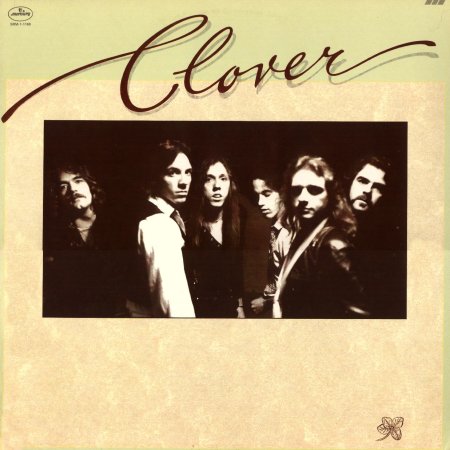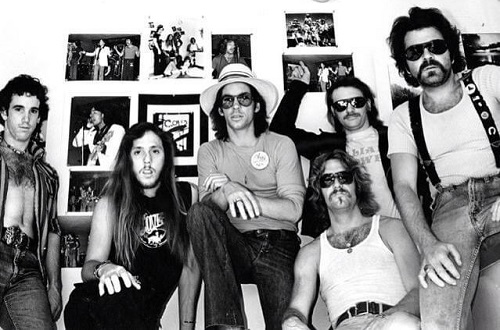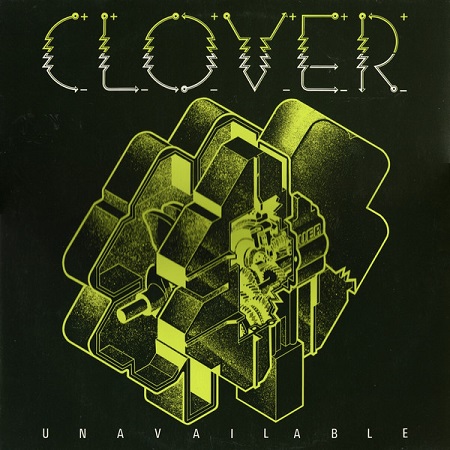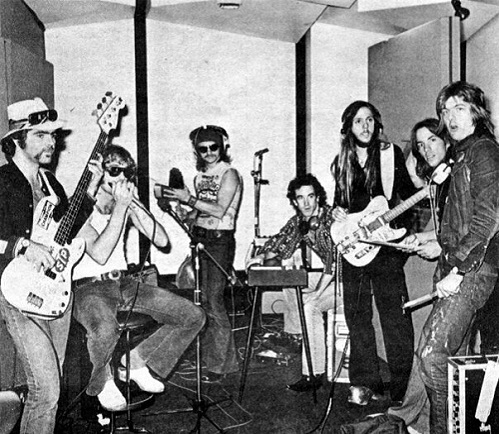Photos courtesy of Alex Call
In 1977, right before punk becomes the zeitgeist musical movement in the UK and the states, a Bay Area-based six-piece band took one last mighty swing at music’s commercial fences.
Sadly, they would strike out.
However, the group Clover remains, to this day, one of the most underrated bands you’ll ever hear. Elvis Costello aficionados, however, may be apt to disagree – after all, several of the group’s members would back the bespectacled, pigeon-toed icon on his landmark debut album My Aim Is True.
For a good chunk of listeners, Clover will likely remain an enigma – a tight-knit band of musical brothers whose sound encapsulates a mélange of genres – there’s smatterings of country; frequent blues pepperings; not so subtle traces of R&B and funk. It’s a rich recipe, but one that didn’t quite go down easy decades ago in an era of soft rock, novelty tracks, and disco.
But if you sift out the individual parts of Clover, you’ll be amazed at the talent that comprises the band: lead singer and guitarist Alex Call, guitarist John McFee, keyboardist Sean Hopper, and a then unknown scruffy harmonica player named Huey Lewis.
The group began as a quartet, releasing two albums on the Fantasy record label (the same one Creedence Clearwater Revival would record for), 1970’s self-titled Clover and 1971’s Forty-Niner. Both would yield little fanfare stateside.

“They were inexpertly made, I would say,” Alex Call told me recently. “Our first producer had never produced a record before. We didn’t know what we were doing. We were learning it as we went. And those records weren’t hits, though they did lead us to make the other records six years later.”
In the gap that would lead to the group’s strongest albums (1977’s Unavailable and Love On The Wire), Clover would infuse Hopper and Huey (initially billed as Huey Louis) into its lineup and pay its dues through constant touring.
“We were playing a local club in Morin County called The Lion’s Share and our buddy Huey Cregg, who later became Huey Lewis and our other buddy Sean Hopper who was in a bluegrass band at the time started sitting in with us. They joined the band in 71,” Call told me. “We always thought we were going to get another record deal, but we didn’t get one for years. In 75, we started getting some momentum again.
“We were kind of a country rock band before … hippie country rock. A lot of long solos and the three-part harmonies that we always had. And then Huey brought in a lot more R&B influence and the blues because of his harmonica playing,” Call adds. “It was very experimental for quite a long time. Sometimes we sounded like a disco band doing horn lines with pedal steel guitar and harmonica. We were a crazy band. I don’t think our sound was very defined.”
Unbeknownst to the group, Clover’s first two albums did catch on in the UK where pub rock acts like Brinsley Schwarz were then the rage. It would be Brinsley member Nick Lowe and future Clover manager and Stiff Records head Jack Riviera who would help the band secure a new deal with Phonogram (Mercury Records in the US).

“The earlier albums had been heard in England. We had no idea. There was a band called Brinsley Schwarz … and they thought Clover was big like The Band. They actually used to play some of our songs,” Call says. “They didn’t know we were a completely unsuccessful band from the Bay Area.”
Manning the production desk for Clover’s two 1977 albums would be an enigmatic giant named Robert John “Mutt” Lange, the man who made AC/DC, Def Leppard, and Bryan Adams synonymous with the term “multi-platinum.”
“(Mutt) hadn’t really had hits yet. Later on he had quite a few,” Call told me. “We really cut our recording teeth with Mutt. That led to a new sound — double tracking a bunch of stuff and quadruple tracking lead guitars and all kinds of stuff that we hadn’t done before.
“Mutt was really easy to work with. He’s a studio rat, which is the game,” he adds. “He was really good at cutting the songs up and rearranging the parts to make them flow faster. I learned a lot about musical economy from Mutt. Really my whole recording persona stems from Mutt. I’ve worked with a lot of other people since but Mutt’s the foundational page for me.”

There’s an undeniable energy on Unavailable (eventually repackaged as the eponymous Clover in the US) and Love on the Wire. The combination of Call’s Dylan-esque Nashville Skyline vocals with McFee’s lightning-fast guitar riffs, in tandem with Hopper’s organ and Lewis’ mighty harmonica blasts and soulful vocals, makes for a truly unique listening experience. It’s somewhat hard to believe that during this time, Huey would sport shoulder-length locks, facial hair, and a more-biker-like appearance — the complete anthesis of the Yuppie-like, clean-cut frontman who would extol the virtues of being “hip to be square” on MTV in the mid-1980s.
“Most of the songs were written pretty close to when they were recorded. A couple things – “Child of the Streets,” that was written in probably ’70, ’71. That’s an old one,” Call told me. “Making an actual album for an actual label kind of brings your energy up. You’re not just making a demo, man – this one counts. It was really fun. We had fun making those records.”
Quick sidebar: Required listening from both albums include the following:
- Unavailable: “Love Love,” “Streets of London,” “The Storm.”
- Love on the Wire: “Southern Belles, “Still Alive,” “California Kid.”
And then there are the tracks where the vocal interplay between members is eye-opening and unsurpassed. The harmonies on “I Lie Awake (And Dream of You)” on Unavailable and “Keep On Rollin” on Love on the Wire, respectively, may put the group in near doo-wop territory but man, do they sound good!
“Those a cappellas were something we did. Actually, we did that even before Huey was in the band,” Call told me. “Early Clover had [bassist] Johnny Ciambotti, John McFee, and me and we all sang. We always did three-part harmonies. I grew up loving the Coasters. Our sound check song was “Chain Gang.” We had a great version of that we did at every sound check we did.”
It’s also clear that Huey keeps this vocal aesthetic in mind as he ascents to superstar status with News’ albums Picture This, Sports, and Fore! Yet while you will hear traces of what ultimately becomes Huey Lewis and the News, Lewis is not the lone frontman here but rather a complementary cog in a powerful musical machine.
“Huey got a good model on how not to be a rock star from me,” Call says. “Huey and I were very close back then. During those years leading up to going to England, we shared a house in Mill Valley and we listened to music and we played records together. We absorbed Little Feat and so much music. Our music is very similar. We come from the same kind of mold. In that period especially, he was around me and I was writing most of the songs. He got a lot of that from me. I mean Huey’s written some great songs. Huey’s a great pop writer but Huey’s thing is to get an idea. In our days he wasn’t quite there yet.
“There’s some good songs on those records,” Call adds. “I kind of wish we had a slightly different sound sometimes. If I had owned an acoustic guitar back then, I think it would have made a difference. But that’s just me – it was all electric guitars for me back then. If it wasn’t an electric guitar, I wouldn’t play it.”
While in the UK, the band would tour with — and find themselves influenced by ─ Thin Lizzy and their charismatic frontman Phil Lynott. The group would play 35 dates with Lizzy, hitting all the classic theater staples (i.e. Leeds Town Hall, Hammersmith Odeon, etc.). Clover would also tour with Graham Parker and the Rumour and southern rock giants Lynyrd Skynyrd (before the tragic deaths of Ronnie Van Zant and Steve and Cassie Gaines).
“We became really tight when (Lizzy). They became our buddies and stayed our buddies when we left England,” Call says. “We were influenced by them for sure. John McFee had wanted to do twin harmonic guitars on everything. He made me play lead parts to harmonize with his parts, which were ridiculously complicated. That was a big influence for sure and a good influence in some ways.”
When both Mercury albums are released, the reaction harkens back to the response the group received for their first two albums, according to Call.
“Unfortunately, the doors that opened were the ones that said ‘Exit’ for the most part,” he says with a laugh. “Jake Riviera came up with that title, Unavailable, and you couldn’t get the record. It WAS unavailable. I don’t know why he thought that was such a brilliant idea. Jake Riviera was the man of brilliant ideas [but] I think he whiffed on that one.
“What really happened to Clover in England was much bigger. It didn’t happen to just Clover. Punk broke out,” Call adds. “It’s funny, we were sitting right on top of it because our management – Dave Robinson and Jake Riviera — ran Stiff Records, which was one of the focal points of punk music. We were hanging out with all those guys — the Damned and Wreckless Eric and, of course, Elvis Costello. We were right on top of all that.”
For Call, the tide officially turns after seeing a then unknown band called play the Roundhouse in London. The group was called The Clash.
“There were about 40, maybe 50 people in the audience. It wasn’t well attended. And they were just awful. They were just awful. But I looked at them and I went, ‘There goes Clover,’ man,” he says. “We’re going the way of the dinosaurs because you could tell this was going to be big.”
Another contributing factor of the band’s bad commercial luck would be a lack of radio airplay.
“We actually got booed off stage a few times opening for Alice Cooper at the Nassau Coliseum on Long Island. They threw M-80s at us; it was like a war zone,” Call told me. “We couldn’t get a hit and that’s the deal. At the time, Mercury was headquartered in Chicago, and we played a gig in Chicago. We had been playing great but it was just dead. It just wasn’t receptive and that was the night the record label heads all came to the gig. About three weeks later they dropped us.

“We certainly gave it our all. We tried everything,” he adds. “We didn’t have any money or anything — we were strictly a band of brothers going at it and sticking up for each other. We had a lot of fun and made some good recordings but if you don’t have a hit single, you eventually get dropped. And that’s what happened.”
In going their separate ways, band members would fortunately achieve the success they dreamed of. Clover bassist John Ciambotti would go on to play with and manage Lucinda Williams; John McFee would enter the Rock and Roll Hall of Fame as a member of the Doobie Brothers; Lewis and Hopper would go on to…well you already know…
Call wouldn’t do too shabbily either. In addition to his solo work, he would hit the top five of the Billboard Hot 100 in 1982 as lead songwriter on Tommy Tutone’s seminal track “867-5309/Jenny.” He would also land a top three hit in 1988 as writer of the Huey Lewis and the News track “Perfect World.”
“It was gratifying to me when “867-5309” got on the radio and went to the top of the charts. That’s hard to get, OK. Having a song get to number four in the country for 40 weeks is an accomplishment. Everybody knows that song still. The funniest thing is when I tell people I wrote it — because it’s great shock value. I universally get this response, ‘You wrote that song?’ I say, ‘Well, someone had to,’” Call says. “Notably Huey did my song “Perfect World” in 1988. I’m very proud of that song. I’m more proud of that than I am of “867-5309” even though “867” has got the legs.”
Now based in Ontario, Canada, Call would reconvene the original four-piece Clover (Call, McFee, Ciambotti, and drummer Mitch Howie) for the 2018 album Homestead Redemption. Through it all, Call sees the entire Clover experience as a memorable — albeit fleeting — musical microcosm in time.
“I just kind of see the thing as episodes that went along,” he says. “It was a really good band … but the sum was less than its parts maybe.”

***
Share your feedback and suggestions for future columns with Ira at [email protected]. Ira’s book, “Hello, Honey, It’s Me”: The Story of Harry Chapin, is available for purchase here.
![]()









